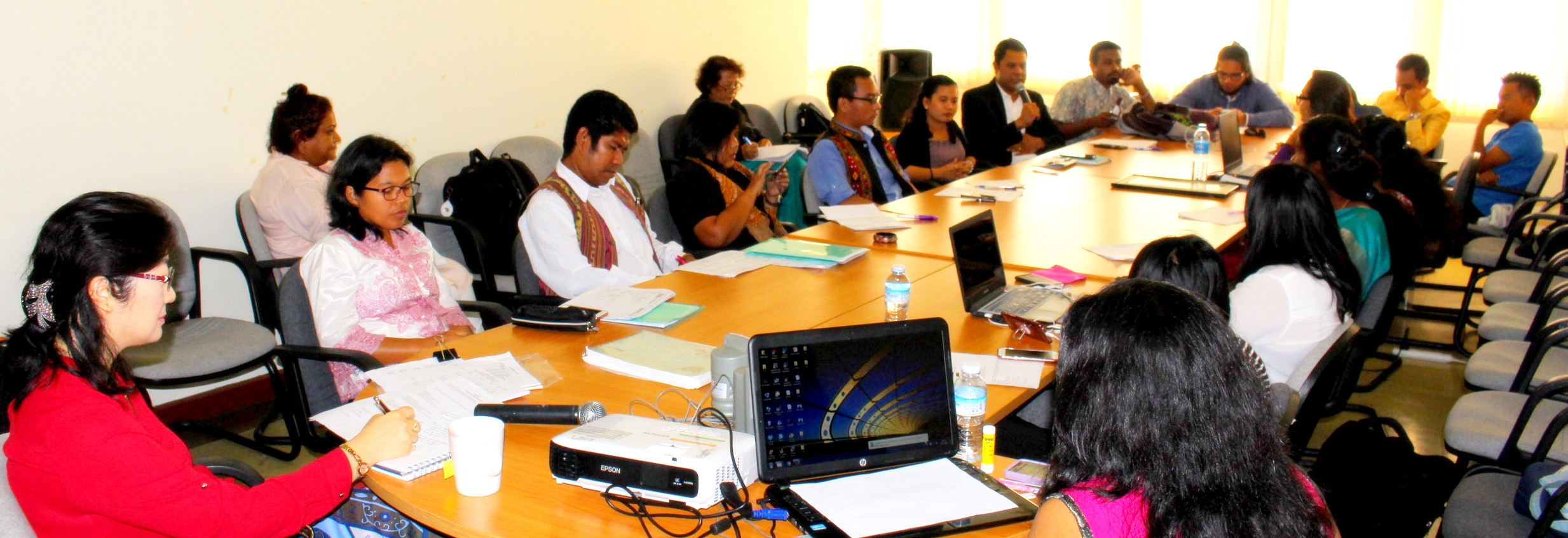Prospective ecumenists trained at the Asian Ecumenical Institute affirm to reshaping ecumenism
 Participants of the AEI-2016.
Participants of the AEI-2016.
“The month-long exposure through the Asian Ecumenical Institute (AEI) has led us to a wider understanding of ecumenism and its mission beyond church boundaries. It has enriched and motivated us to become part of the ecumenical movement. The experiences from the AEI sensitized us to understand the struggles and realities prevalent in various parts of Asia. This experience has opened our minds and vastly contributed to our ministerial formation in doing God’s Mission,” said Rev. Shuba Keerthana, a participant of the AEI, who is a young woman pastor from the Church of South India, at the end of the AEI.
The AEI - a new initiative aimed at the ecumenical formation and leadership development of prospective ecumenical leaders in Asia - concluded in a valedictory ceremony held at the headquarters of the Christian Conference of Asia (CCA).
Seventeen young participants from across Asia testified at the end of the AEI that the course helped them to contextually understand wider issues in ecumenical perspectives. The AEI-2016 focused on the theme ‘Shaping a New Paradigm for Wider Ecumenism in Asia’.
“The AEI program has helped strengthened my strategies for the future. Previously, I was just viewing the problems that my church faces, and only talking about a feminist theology around my church and the cultural contexts of Indonesia. But now, I clearly see the issues around churches and societies in a holistic Asian context,” Nurseli Manurung from the Huria Kristen Batak Protestant (HKBP) in Indonesia said.
“The Asian Ecumenical Institute has provided me with a wonderful opportunity to enhance my understanding of ecumenism. It has enriched my knowledge regarding the struggles and challenges of the people in Asia and beyond. I have gained fresh insights, which will help me see the contemporary challenges in Aotearoa, New Zealand in a new light. I am deeply grateful to the CCA for bringing a diverse group of people together. This convergence has enabled a diverse set of voices to tell their stories of struggles and successes. Without CCA’s commitment to ecumenical empowerment this might not have been possible,” Abhishek Solomon from the Methodist Church of New Zealand said.
While presenting their research papers on a wide range of issues, the participants shared their views and affirmed to be engaged in building inclusive communities by nurturing youth leaderships, focusing on building peace, upholding the dignity of women, children and people with disabilities, and highlighting climate change and ecological justice in their respective churches.
“The Asian Ecumenical Institute 2016 was an unforgettable experience for me. I learned that our societies label people based on their cultures and beliefs. However, coming together and sharing one’s life, as we have done during the AEI, can open the door for dialogue and collaboration in Asia. The AEI has taught me that ecumenism is a bridge for obtaining peace and justice,” Ms. Zhara Jhane A. Alegre from the United Church of Christ in the Philippines (UCCP) commented.
Addressing the students at the valedictory ceremony of the AEI, Rev. Jung Eun Moon, CCA Program Coordinator said, “The AEI has extended you opportunities for changing your hearts and minds, and we hope that it has enhanced your understanding on wider ecumenism.”
Prof. Dr. Chuleepran Srisontorn, who coordinated the academic activities of the AEI told the students, “We were pleased to see how all of you wholeheartedly accepted each other and worked closely together during your time together at the AEI. We pray that the experiences you gained here will be fruitful to yourselves, your communities and to the world.”










